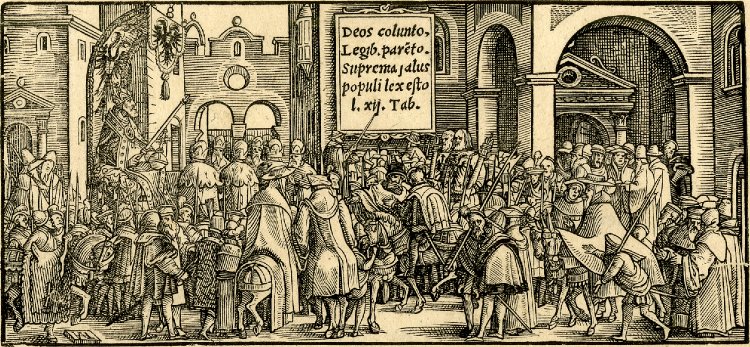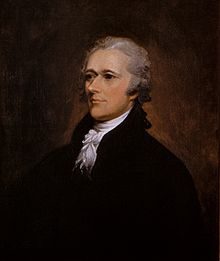In 1517, when the 95 Theses were first posted, Martin Luther had no intention of breaking from the Roman Catholic Church. Rather, he sought to reform the Church’s view on indulgences, believing that no one could buy their way into heaven. Believing that his view was deeply rooted in Scripture, he was confident that Church scholars would agree with him. Instead, the Church hierarchy responded by accusing Luther of heresy, wanting to quell any question of their authority. As a result, what was initially an effort to reform the Catholic faith eventually transformed into a major schism in Christianity itself.

Prior to sparking the Protestant movement, Martin Luther was an Augustinian monk teaching at the University of Wittenberg in Germany. In 1517, Pope Leo X sanctioned indulgences to be sold to raise money for the construction of St. Peter’s Basilica in Rome. An indulgence consisted of money given to the Church in exchange for less time in purgatory, which was conceived as a theological waiting room where imperfect souls were purified after death before they enter heaven. People essentially believed that this meant they could buy a way into heaven for themselves and their loved ones.1 As a result of the Pope’s decree, a Dominican monk, Johann Tetzel, began preaching in favor of these indulgences in the towns of Jüterbog and Zerbst near the university.2 Luther responded to this by writing to the archbishop, admonishing him by asserting that simply paying money to the Church does not purify the soul.
When his protestations went unanswered, Luther posted his 95 Theses. The theses were arguments opposing the manner in which indulgences were being sold.3 Most of the theses did not contradict Catholic doctrine, so it is widely believed that Luther wrote them to spark a theological academic debate. The theses, originally written in Latin, were translated into German and put into wide circulation; this caught the attention of Rome. Fearing that the funding for St. Peter’s Basilica was under threat, Leo ordered Luther to be investigated. In response, Luther sought the support of a Germanic prince, Frederick the Wise. Frederick granted Luther support and protection, insisting that the investigation take place in Germany.4 In response, Leo asked the papal legate in Augsburg, Cardinal Cajetan, to investigate Luther. Brought before Cajetan, Luther was asked to renounce his theses and recant his accusations against the Church. Luther refused, but agreed to stop commenting on indulgences and listen to the Church. Although this was not Cajetan’s desired result, Frederick allowed Luther to return to Wittenberg.5

The following year, 1519, Luther agreed to debate the theologian Johann Eck. Eck instigated the debate by comparing Luther’s positions to Jan Hus, a well-known heretic that had been excommunicated and executed a hundred years earlier. This forced Luther to declare that the Church had been wrong to condemn Hus, opening himself to charges of heresy.6 Eck had given the pope the opportunity to bring excommunication charges against Luther. However, the Holy Roman Emperor Charles V, not wanting to upset Frederick the Wise, forced the pope to subject Luther to a hearing at the Diet of Worms. At this time, Luther’s cause was gaining popularity among Germans. The emperor could not afford to upset the German prince, needing his support to fight an ongoing war with France and keep the Ottoman Empire from Austrian lands.7
During the trial, Luther was led into a room where his accusers had piled his works on a table, read the titles aloud, and asked if these books belonged to Luther. Luther replied that the books belonged to him. He was then asked to renounce them. Luther then asked for time to consider. When he returned the next day he refused to reject anything, saying that unless he was disproved by Scripture, he was bound by his conscience to defend his work.8 He felt that he was strongly supported by the Bible. However, Church officials saw this as a rejection of their authority rather than an appeal to Scripture. Charles V, though angered, could do nothing to condemn Luther as long as he remained at war. Instead, he planned to send Luther back to Wittenberg marked as a heretic.9 However, before he reached the university, Frederick the Wise secretly had Luther taken to Wartburg Castle.10
Throughout the next few years, Luther continued to defend his works. One of his biggest achievement during this time was the translation of the Bible from Latin into German. Still, he was forced to remain hidden. Charles V, after securing an alliance with the pope in the war against France, no longer needed ties with Frederick the Wise. This allowed the papal bull, proclaiming Luther’s excommunication, to be issued, adding a decree which ordered that no one give Luther refuge.11 It was ultimately his refusal to retract his works that prevented Luther from reforming the Church. Pope Leo X, Charles V, and other high Church officials perceived Luther’s passion for reform as a challenge to authority. In contrast, Luther believed that his works were strongly supported in Scripture. The miscommunication and stubbornness of both parties ultimately led to a major schism within Christianity. When the Church labeled him a heretic, Luther had no choice but to begin his own branch of Christianity, Lutheranism, so that he could continue to practice the faith to which he had dedicated his life.
- Renaissance and Reformation Reference Library, July 2002, s.v. “Martin Luther: Founder of Lutheranism” edited by Julie L. Carnegie. ↵
- New Catholic Encyclopedia, September 2003, s.v. “Luther, Martin” by Bill Ditewig. ↵
- Funk and Wagnalls New World Encyclopedia, 2016, s.v. “Luther, Martin” ↵
- Renaissance and Reformation Reference Library, July 2002, s.v. “Martin Luther: Founder of Lutheranism” edited by Julie L. Carnegie. ↵
- New Catholic Encyclopedia, September 2003, s.v. “Luther, Martin” by Bill Ditewig. ↵
- Renaissance and Reformation Reference Library, July 2002, s.v. “Martin Luther: Founder of Lutheranism” edited by Julie L. Carnegie. ↵
- Renaissance and Reformation Reference Library, July 2002, s.v. “Martin Luther: Founder of Lutheranism” edited by Julie L. Carnegie. ↵
- Encyclopedia of World Biography, December 2004, s.v. “Martin Luther,” by Andrea Henderson. ↵
- Julius Koestlin, Life of Luther (Project Gutenberg Literary Archive Foundation, 2006), 105-116. ↵
- Funk and Wagnalls New World Encyclopedia, 2016, s.v. “Luther, Martin” ↵
- Julius Koestlin, Life of Luther (Project Gutenberg Literary Archive Foundation, 2006), 105-116. ↵



94 comments
Jose Maria Gallegos Cebreros
First of all, congrats and thanks for this great article, it is so informative. You were able to give the message without making it long, it is short and simple. I think Martin Luther is a well known character mentioned in a lot of history classes/books and you gave me a lot of information that I did not know about before.
Anayetzin Chavez Ochoa
Ironic to think a misunderstanding got Martin Luther into a bit of a pickle. If the modern world is a testament to how sensitive the discussion of religion is, I can’t imagine how much worse it was around the time of Martin Luther without the internet. People WITHIN the church were arguing about the intent behind scripture. I’ve never heard of an assembly referred to as a “Diet” so thank you for enlightening me. It’s interesting to see how the church was (always) debating whether to follow Scripture verbatim or through interpretation (which was more abusive, i. e. the Pharisees vs the new teachings of Jesus as a biblical example). Thank you for writing this!
Jared Sherer
Martin Luther showed great courage and leadership in his lowest moments not many people would be able to overcome. The writer of this article did an excellent job describing Luther’s strong pursuit in pointing out the wrong doings of the Catholic Church. Valdez writes clearly and depicts the story of Martin Luther in a professional way. She gives clear and detailed explanations on Luther’s journey to defending himself not only from being excommunicated or even killed, but also defending his beliefs from the Catholic Church. The author shows her research skills very well and tells the story of Martin Luther and his journey with the Church very well. The article reads almost like part of a history book written by a professional historian.
Jaedon E
Very interesting article and I admire how you put it together! Furthermore I find this article interesting because many Kingdoms believed that Luther was desiring to gain power and authority from the people by allowing them to see his ideal thoughts and beliefs that he got from reading the bible and what he learned from scripture. I can understand why many issued not provide no refuge to Luther due to his beliefs within trying to secure a spot in heaven and for others.
Nicholas Quintero
This article was very informative and interesting! I like how the article immediately hooks you with the 95 thesis and the response from the church, and then in the next paragraph starts the story. the author did a very good job of structuring and writing this article.
Mauricio Rebaza Figueroa
As you describe, it will always be such a mystery what would have happened if the people in charge of the Church at that time would had listened and taken in count what Martin Luther wanted to correct. Good information, use of images, very rich information and trustworthy sources that complement the historical event you are telling us through this article. Very good job.
Mauricio Rebaza Figueroa
I think that the historical data you put onto this article is something really important because you are giving the reader a really well elaborated context on what they are learning about and helps with the trust worthiness of the article. Also, the images you have used for it have a big relation to what you are talking about and it makes it more interesting to read, instead of just leaving to our imagination what are we reading about. That is something you did good and I am thankful for. Also, I found the article quite interesting because my country’s history is quite related to Spain’s, so I could learn more about it. Very good job.
Mauricio Rebaza Figueroa
As you describe, it will always be such a mystery what would have happened if the people in charge of the Church at that time would had listened and taken in count what Martin Luther wanted to correct. Good information, use of images, very rich information and trustworthy sources that complement the historical event you are telling us through this article. Good job.
Victorianna Mejia
I loved this article! It was so informative. The fascinating part that just spoke to me was how Frederick the Wise supported and protected Martin Luther. I would like to think they had a great friendship as well. Especially since Frederick the Wise secretly had Luther taken to Wartburg Castle. Overall, I think this article was greatly written, and it had me intrigued through the whole reading. Good Job!
Matthew Gallardo
This story is saddening from Martin Luther’s point of view. Martin Luther tried so hard to push for reform because Christianity and god was something he genuinely believed in, but instead he got backlash and was labeled as a heretic. However he still stuck with his faith and his beliefs, turning a bad situation into a good one by branching off and creating a separate entity from the catholic church.